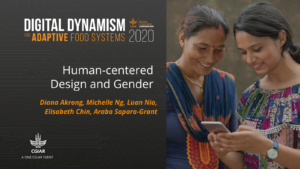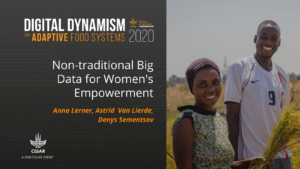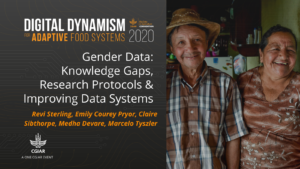Big Data on Gender
Our Initiatives
However, in comparison to men, women farmers generally face unequal access to and control over key productive assets that could improve their agricultural productivity and profitability, such as smartphones and mobile internet, savings and credit, land, and other agricultural inputs.
Although these disparate trends are clear, holes persist in our understanding of the full complexity and scope of issues impacting women smallholder farmers; most data collection tends to be at the household level, which often does not capture nuanced intra-familial gender dynamics. Systems for collecting, analyzing, sharing, and using good quality, FAIR (findable, accessible, interoperable, and reusable) sex-disaggregated data are lacking, and opportunities to leverage non-traditional big data sources, such as mobile phone and social media data, for women’s empowerment remain largely unexplored.
In collaboration with CGIAR and partners, the Platform for Big Data in Agriculture is working to improve our understanding of relationships among gender, agriculture, and rapidly digitizing economies and develop FAIR data systems that enable gender data to be used to its full potential.
Globally,
1/3 of women’s employment is in agriculture
Besides, data collection tends to be at the household level & does not capture intra-familial gender dynamics
But women in agriculture are less likely than men to own a smartphone and access the internet
Given equal access to resources, women farmers would eliminate hunger for 150 million people
Our initiatives
The CGIAR Platform for Big Data in Agriculture aims to advance gender equality in agricultural research and development by:
Increasing the visibility of sex-disaggregated data and gender-sensitive research and data
See our activities
Preliminary, collaborative research by the BIG DATA and CGIAR Generating Evidence and New Directions for Equitable Results (GENDER) Platform on the findability of gender data sets is informing work with the CGIAR Metadata Working Group to enhance gender data discovery, as well as allow for the reuse of gender-disaggregated data sets—essential for advancing gender research across CGIAR and unlocking new big data-enabled methods that can be used for researching and advancing gender equality.
Leveraging big data sources and methods in support of gender research
See our activities
The BIG DATA and GENDER Platforms spearheaded a novel approach to studying women’s economic empowerment in 2019. The partners conducted a phone-based survey of 10,000 respondents and used it to analyze billions of data points in call detail records (CDRs)—anonymous data generated by the operation of mobile phone networks—to predict gender and decision-making power among female farmers on a national scale in Uganda. The approach demonstrated the potential for observing changes in female farmers’ economic empowerment with greater speed and scale compared with solely survey-based methods.
BIG DATA and GENDER will seek to refine this approach to be replicable in any country where call detail record data can be obtained.
Providing funding and support for gender-sensitive, big data-enabled projects
See our activities
The BIG DATA Platform’s Inspire innovation challenge prioritizes gender-sensitive research.
In 2019, 80% of Inspire Challenge participants included a gender component in their research proposals, up from 70% in 2018. The gender dimensions of the project proposals were evaluated with a rubric and scoring matrix designed to explicitly assess whether and how proposals deal with gender issues.
Inspire Challenge projects present a valuable opportunity to reveal insights about the evolving relationships among gender and digital agriculture. Following GENDER Platform recommendations, the 2020 Inspire Challenge features additional, rigorous gender mainstreaming components.
Contribute to sector-wide research and efforts to narrow the digital divide
See our activities
The BIG DATA Platform aims to support CGIAR and partner initiatives to annotate data, explore new big data-enabled methods, and leverage information and communications technologies (ICTs) to full effect to empower women in agriculture.
Get involved
These groups are open to all.
100Q
The Community of Practice on Socio-Economic Data is working on data harmonization and standardization through the definition of key concepts and related questions. Part of this work relates to minimum data that needs to be collected to get a basic sense of women’s empowerment.
For more information please contact Mark van Wijk.
Socio-Economic Ontology (SEONT)
The SEONT working group is working towards a socio-economic ontology of controlled vocabularies, classifications, and concordances that allow standardization of key indicators, including gender-related indicators.
The ontology has been developed by CGIAR researchers from the International Food Policy Research Institute (IFPRI), Bioversity International, and the International Maize and Wheat Improvement Centre (CIMMYT). The SEONT working group works in close collaboration with the Community of Practice on Socio-Economic Data led by Gideon Kruseman.
For more information, please contact Soonho Kim.






